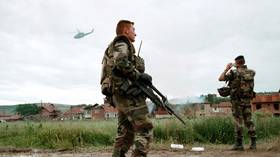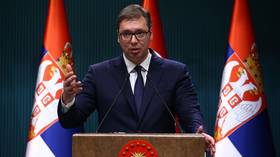NATO reveals plan in case tensions escalate in Kosovo

NATO is prepared to send more of its troops to Kosovo in the event that tensions between local authorities and minority Serbs turn violent amid a vehicle-licensing standoff between Belgrade and Pristina.
Deputy commander of the US-led bloc’s peacekeeping mission in Kosovo (KFOR), Brigadier General Luca Piperni, told journalists on Tuesday that alliance forces are “vigilant and ready to act” if tensions rise.
“We can also draw on reserve forces that we can call in at short notice,” Piperni was quoted as saying by Reuters.
The statement comes after NATO’s secretary general proclaimed last month that the bloc was ready to intervene if “stability” is jeopardized in Kosovo, adding that KFOR would take “any measures that are necessary to ensure a safe and secure environment and freedom of movement for all the people of Kosovo.”
Tensions between Kosovo and Serbia escalated back in August after Pristina passed a law banning Serbian-issued documents and vehicle license plates. Kosovo tried to enforce the new measure by sending heavily armed special police to take control of the Serbia-Kosovo border while local Serbs resisted by erecting roadblocks and engaging in violent clashes with Pristina’s forces.
After NATO peacekeepers were deployed to defuse the situation, Pristina’s government agreed to delay the implementation of the new law in return for the protesters dismantling their barricades.
However, as the October 31 deadline for the end of that postponement approaches, many fear tensions will once again flare up on the border between Serbia and Kosovo.
Serbian President Aleksandar Vucic has accused Pristina of challenging his country’s security and creating the risk of violent clashes in the region by increasing the presence of special forces on the border.
He has also hit out at the EU for trying to pressure Belgrade to resolve the conflict by signing an agreement with Pristina, which Vucic says would essentially recognize the breakaway province.
After gathering support from the West, Kosovo declared its independence in 2008. However, while the US and many of its allies have recognized it as independent, Serbia, Russia, China, the UN, and five EU member states have not.













